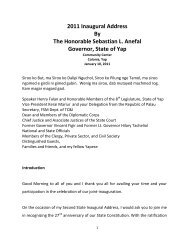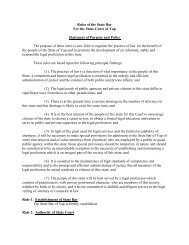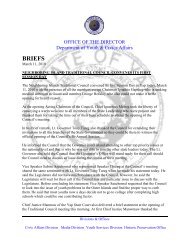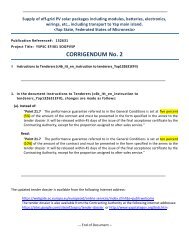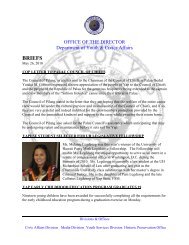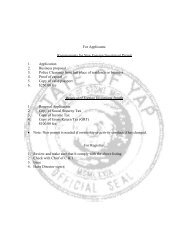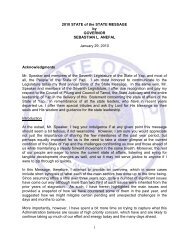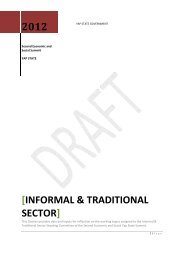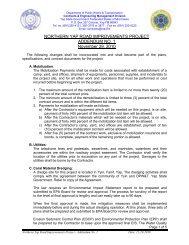RULES OF CIVIL PROCEDURE For the Trial Division of the Yap ...
RULES OF CIVIL PROCEDURE For the Trial Division of the Yap ...
RULES OF CIVIL PROCEDURE For the Trial Division of the Yap ...
Create successful ePaper yourself
Turn your PDF publications into a flip-book with our unique Google optimized e-Paper software.
(2) <strong>For</strong> All O<strong>the</strong>r Cases. In all o<strong>the</strong>r cases <strong>the</strong> party entitled to a judgment <strong>of</strong><br />
default must apply to <strong>the</strong> court for a default judgment; but no judgment by default shall<br />
be entered against an infant or incompetent person unless represented in <strong>the</strong> action by a<br />
general guardian, committee, conservator, or o<strong>the</strong>r such representative who has appeared<br />
<strong>the</strong>rein. If <strong>the</strong> party against whom judgment by default is sought has appeared in <strong>the</strong><br />
action, he (or, if appearing by representative, his representative) shall be served with<br />
written notice <strong>of</strong> <strong>the</strong> application for judgment at least 3 days prior to <strong>the</strong> hearing on such<br />
application. If, in order to enable <strong>the</strong> court to enter judgment or to carry it into effect, it is<br />
necessary to take an account or to determine <strong>the</strong> amount <strong>of</strong> damages or to establish <strong>the</strong><br />
truth <strong>of</strong> any averment by evidence or to make an investigation <strong>of</strong> any o<strong>the</strong>r matter, <strong>the</strong><br />
court may conduct such hearings or order such references as it deems necessary and<br />
proper and shall accord a right <strong>of</strong> trial to <strong>the</strong> parties when and as required by any law <strong>of</strong><br />
<strong>the</strong> State <strong>of</strong> <strong>Yap</strong>.<br />
(c) Setting Aside a Default or a Default Judgment.<br />
The court may set aside an entry <strong>of</strong> default for good cause, and it may set aside a default<br />
judgment under Rule 60(b). A default judgment rendered on service may be set aside<br />
only on a showing <strong>of</strong> good cause which would be timely and sufficient to set aside a<br />
default judgment entered upon personal service within <strong>the</strong> state.<br />
(d) Plaintiffs, Counterclaimants, Cross-Claimants. The provisions <strong>of</strong> this rule apply<br />
whe<strong>the</strong>r <strong>the</strong> party entitled to <strong>the</strong> judgment by default is a plaintiff, a third-party plaintiff,<br />
or a party who has pleaded a cross-claim or counterclaim. In all cases a judgment by<br />
default is subject to <strong>the</strong> limitations <strong>of</strong> Rule 54(c).<br />
(e) Judgment Against <strong>the</strong> State <strong>of</strong> <strong>Yap</strong>. No judgment by on <strong>the</strong> issue <strong>of</strong> liability alone<br />
although <strong>the</strong>re is a genuine issue as to <strong>the</strong> amount <strong>of</strong> damages.<br />
Comment: Rule 55 has been amended to require <strong>the</strong> court to enter default and<br />
default judgments ra<strong>the</strong>r than <strong>the</strong> court clerk. In light <strong>of</strong> <strong>the</strong> size, organization, and<br />
workload <strong>of</strong> <strong>the</strong> <strong>Yap</strong> State Court, it is unlikely that requiring <strong>the</strong> clerk to enter default or<br />
default judgment in certain circumstances is necessary. A stylistic change has been made<br />
to part (c) to ease comprehension.<br />
Rule 56. Summary Judgment. (Declaratory Judgment)<br />
(a) <strong>For</strong> Claimant. A party seeking to recover upon a claim, counterclaim, or crossclaim<br />
or to obtain a declaratory judgment may, at any time after <strong>the</strong> expiration <strong>of</strong> 20 days<br />
from <strong>the</strong> commencement <strong>of</strong> <strong>the</strong> action or after service <strong>of</strong> a motion for summary judgment<br />
by <strong>the</strong> adverse party, move with or without supporting affidavits for a summary judgment<br />
in <strong>the</strong> party's favor upon all or any part <strong>the</strong>re<strong>of</strong>.<br />
(b) <strong>For</strong> Defending Party. A party against whom a claim, counterclaim, or cross-claim<br />
is asserted or a declaratory judgment is sought may, at any time, move with or without



